-
 Bitcoin
Bitcoin $83,918.5249
-1.85% -
 Ethereum
Ethereum $1,581.2485
-2.99% -
 Tether USDt
Tether USDt $1.0000
0.01% -
 XRP
XRP $2.0743
-3.55% -
 BNB
BNB $579.5840
-1.37% -
 Solana
Solana $125.4799
-4.99% -
 USDC
USDC $1.0000
0.01% -
 TRON
TRON $0.2542
2.42% -
 Dogecoin
Dogecoin $0.1532
-3.78% -
 Cardano
Cardano $0.6058
-4.94% -
 UNUS SED LEO
UNUS SED LEO $9.3964
-0.35% -
 Chainlink
Chainlink $12.1811
-3.14% -
 Avalanche
Avalanche $18.8831
-5.08% -
 Stellar
Stellar $0.2339
-3.14% -
 Toncoin
Toncoin $2.8495
-4.08% -
 Shiba Inu
Shiba Inu $0.0...01162
-2.50% -
 Sui
Sui $2.0764
-5.19% -
 Hedera
Hedera $0.1576
-4.85% -
 Bitcoin Cash
Bitcoin Cash $320.4674
-3.22% -
 Litecoin
Litecoin $75.2096
-2.87% -
 Polkadot
Polkadot $3.5156
-3.68% -
 Dai
Dai $1.0002
0.02% -
 Bitget Token
Bitget Token $4.2993
-0.38% -
 Hyperliquid
Hyperliquid $15.1677
-6.18% -
 Ethena USDe
Ethena USDe $0.9993
0.02% -
 Pi
Pi $0.6229
-7.94% -
 Monero
Monero $217.5469
1.67% -
 Uniswap
Uniswap $5.1595
-4.11% -
 OKB
OKB $52.2699
-0.13% -
 Pepe
Pepe $0.0...07109
-2.67%
What is DeFi insurance? How does it protect user funds?
DeFi insurance, managed via smart contracts on blockchains, safeguards users from losses due to hacks, smart contract flaws, and other DeFi risks.
Apr 15, 2025 at 02:22 pm
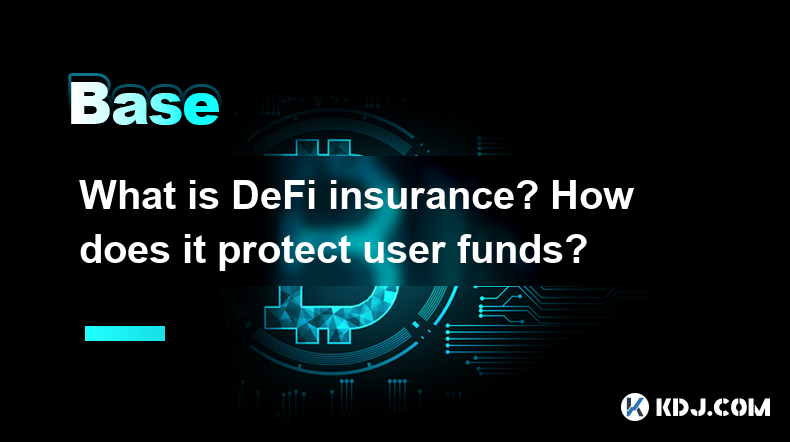
What is DeFi insurance? How does it protect user funds?
Decentralized Finance (DeFi) has revolutionized the way users interact with financial services on the blockchain. However, with the rise of DeFi, the need for robust security measures has become paramount. DeFi insurance is a critical component of this ecosystem, designed to protect users against potential losses due to hacks, smart contract vulnerabilities, and other risks inherent in decentralized platforms. This article will delve into the intricacies of DeFi insurance, explaining what it is and how it safeguards user funds.
What is DeFi Insurance?
DeFi insurance refers to insurance products offered within the decentralized finance space. These products are typically managed through smart contracts on blockchain networks, providing coverage for various risks associated with DeFi activities. Unlike traditional insurance, which is managed by centralized entities, DeFi insurance operates on decentralized protocols, ensuring transparency and reducing the need for intermediaries.
Types of DeFi Insurance
There are several types of DeFi insurance products available, each designed to address specific risks within the DeFi ecosystem. Some of the most common types include:
Smart Contract Insurance: This type of insurance protects users against losses resulting from vulnerabilities or bugs in smart contracts. Given that smart contracts are the backbone of many DeFi applications, this insurance is crucial for mitigating the risk of code-related failures.
Custodial Insurance: This insurance covers losses due to hacks or thefts from centralized custodians or wallets. It is particularly relevant for users who store their assets with third-party services within the DeFi space.
Stablecoin Depeg Insurance: This type of insurance protects users against the risk of stablecoins losing their peg to the underlying asset, such as the US dollar. It is essential for users who rely on stablecoins for transactions and liquidity within DeFi platforms.
How Does DeFi Insurance Protect User Funds?
DeFi insurance protects user funds through a combination of smart contract technology and decentralized governance. Here's a detailed look at how it works:
Smart Contract Execution: When a user purchases DeFi insurance, they interact with a smart contract that outlines the terms and conditions of the coverage. This smart contract automatically executes based on predefined conditions, ensuring that claims are processed transparently and efficiently.
Decentralized Governance: Many DeFi insurance protocols are governed by decentralized autonomous organizations (DAOs). These DAOs allow token holders to vote on critical decisions, such as the addition of new coverage options or the handling of claims. This decentralized governance model ensures that the insurance protocol remains fair and aligned with the interests of its users.
Collateral and Reserves: To back the insurance coverage, DeFi insurance protocols often require collateral or maintain reserves. These reserves are typically held in a decentralized manner, ensuring that funds are available to pay out claims when necessary. The collateral or reserves act as a safety net, providing assurance to users that their funds are protected.
Risk Assessment and Pricing: DeFi insurance protocols use sophisticated algorithms to assess the risk associated with different DeFi activities. Based on this risk assessment, the protocols set premiums that users must pay to obtain coverage. This pricing mechanism ensures that the insurance remains sustainable and that users are charged fairly based on the level of risk they are exposed to.
How to Purchase DeFi Insurance
Purchasing DeFi insurance involves several steps, which can vary depending on the specific protocol. Here's a general guide on how to obtain DeFi insurance:
Choose a DeFi Insurance Protocol: Start by researching and selecting a reputable DeFi insurance protocol that offers the type of coverage you need. Some popular options include Nexus Mutual, Unslashed Finance, and InsurAce.
Connect Your Wallet: To interact with the DeFi insurance protocol, you'll need to connect your cryptocurrency wallet. Most protocols support popular wallets like MetaMask or WalletConnect.
Select Coverage: Once connected, navigate to the coverage options and select the type of insurance you want to purchase. This could be smart contract insurance, custodial insurance, or stablecoin depeg insurance, depending on your needs.
Enter Coverage Details: Specify the amount of coverage you need and the duration of the policy. Some protocols may require you to provide additional information, such as the specific smart contract or asset you want to insure.
Pay the Premium: After entering the coverage details, you'll be prompted to pay the premium. This is typically done in the native token of the insurance protocol or a widely accepted cryptocurrency like Ethereum.
Confirm the Transaction: Once you've paid the premium, confirm the transaction through your wallet. The smart contract will then execute, and you'll receive confirmation of your insurance coverage.
Benefits of DeFi Insurance
DeFi insurance offers several benefits to users within the decentralized finance ecosystem:
Enhanced Security: By providing coverage against various risks, DeFi insurance enhances the overall security of the DeFi ecosystem. Users can engage in DeFi activities with greater confidence, knowing that their funds are protected.
Transparency and Trust: The use of smart contracts and decentralized governance ensures that DeFi insurance operates transparently. Users can trust that their claims will be processed fairly and that the protocol is managed in their best interests.
Accessibility: DeFi insurance is accessible to anyone with an internet connection and a cryptocurrency wallet. This democratizes access to insurance, allowing users from around the world to protect their funds without relying on traditional financial institutions.
Flexibility: DeFi insurance protocols often offer a range of coverage options, allowing users to tailor their insurance to their specific needs. This flexibility ensures that users can find the right level of protection for their DeFi activities.
Challenges and Considerations
While DeFi insurance offers significant benefits, there are also challenges and considerations that users should be aware of:
Regulatory Uncertainty: The regulatory landscape for DeFi insurance is still evolving. Users should be aware of the potential legal risks associated with purchasing insurance through decentralized protocols.
Counterparty Risk: Although DeFi insurance aims to reduce counterparty risk, there is still a risk that the protocol itself could fail or be hacked. Users should carefully assess the security and reliability of the insurance protocol before purchasing coverage.
Complexity: DeFi insurance can be complex, requiring users to understand the intricacies of smart contracts and decentralized governance. Users should take the time to educate themselves about the protocol and its terms before purchasing insurance.
Liquidity Risk: Some DeFi insurance protocols may face liquidity issues, particularly if there is a high volume of claims. Users should consider the liquidity of the protocol and the availability of reserves when selecting an insurance provider.
Frequently Asked Questions
Q: Can I purchase DeFi insurance for any DeFi platform?
A: Not all DeFi insurance protocols offer coverage for every DeFi platform. It's important to check the specific coverage options of the insurance protocol you are considering to ensure that it covers the platforms and activities you are engaged in.
Q: How are claims processed in DeFi insurance?
A: Claims in DeFi insurance are typically processed through smart contracts. When a user submits a claim, the smart contract automatically verifies the claim against the predefined conditions of the policy. If the claim is valid, the smart contract executes, and the user receives the payout directly to their wallet.
Q: What happens if the DeFi insurance protocol itself is hacked?
A: In the event that a DeFi insurance protocol is hacked, the impact on users depends on the specific protocol and its security measures. Some protocols may have additional layers of protection, such as multi-signature wallets or decentralized governance, to mitigate the risk of hacks. Users should carefully assess the security measures of the protocol before purchasing insurance.
Q: Are there any alternatives to DeFi insurance for protecting my funds?
A: Yes, there are several alternatives to DeFi insurance for protecting your funds. These include using hardware wallets for enhanced security, diversifying your investments across multiple DeFi platforms, and engaging in thorough due diligence before participating in any DeFi activity. Each of these methods can help mitigate the risks associated with DeFi, although they may not offer the same level of protection as insurance.
Disclaimer:info@kdj.com
The information provided is not trading advice. kdj.com does not assume any responsibility for any investments made based on the information provided in this article. Cryptocurrencies are highly volatile and it is highly recommended that you invest with caution after thorough research!
If you believe that the content used on this website infringes your copyright, please contact us immediately (info@kdj.com) and we will delete it promptly.
- From Meme Coin to Serious Contender: Dogecoin (DOGE) Reaches a Market Cap of $750 Million
- 2025-04-16 18:20:13
- Semler Scientific Is Going All-In on Bitcoin With a $500M Securities Offering and a New Loan Agreement With Coinbase
- 2025-04-16 18:20:13
- The battle over digital freedom of expression and the adoption of Bitcoin
- 2025-04-16 18:15:13
- Upbit Lists WalletConnect (WCT) for Trading on KRW, BTC, and USDT Markets on April 16
- 2025-04-16 18:15:13
- Bitcoin (BTC) Prices Today Reflect Minor but Notable Losses
- 2025-04-16 18:10:13
- Tether Invests in Fizen, a Fintech Firm Focusing on Digital Asset Payments and Private Crypto Wallets
- 2025-04-16 18:10:13
Related knowledge
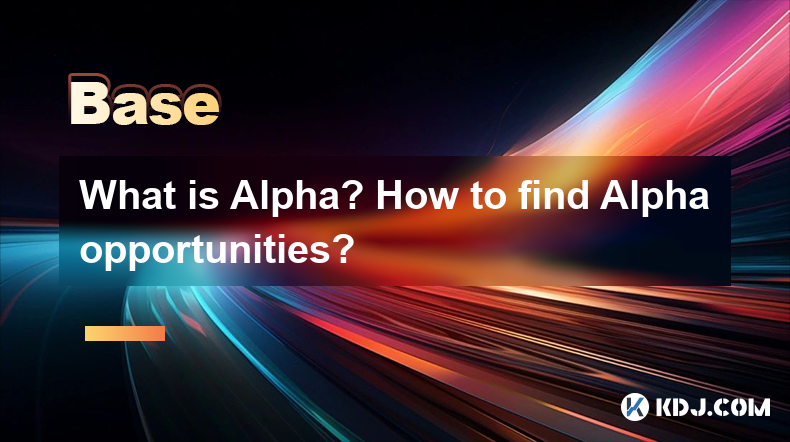
What is Alpha? How to find Alpha opportunities?
Apr 16,2025 at 12:42pm
What is Alpha?Alpha is a term widely used in the financial world, including the cryptocurrency market, to describe the ability of an investment to outperform a benchmark. In the context of cryptocurrencies, alpha refers to the excess return an investor achieves over the market's average return. For example, if the overall crypto market grows by 10% in a...
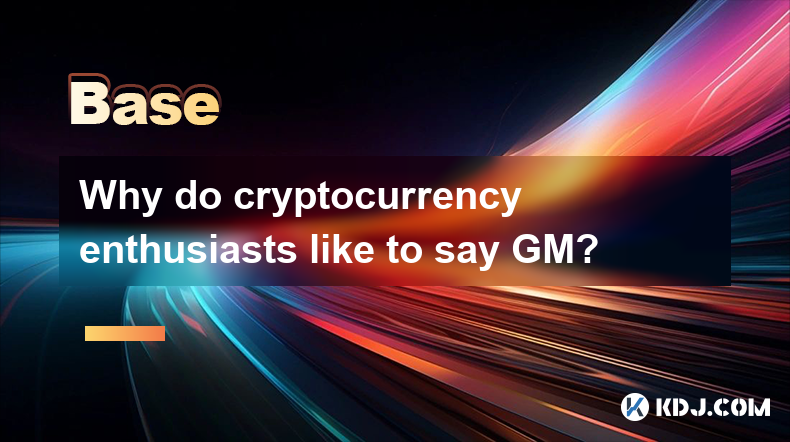
Why do cryptocurrency enthusiasts like to say GM?
Apr 16,2025 at 06:21am
In the world of cryptocurrency, the term 'GM' has become a popular greeting among enthusiasts. GM stands for 'Good Morning,' and its widespread use within the crypto community has a deeper significance than just a simple greeting. This article delves into the reasons why cryptocurrency enthusiasts like to say GM, exploring its origins, cultural signific...
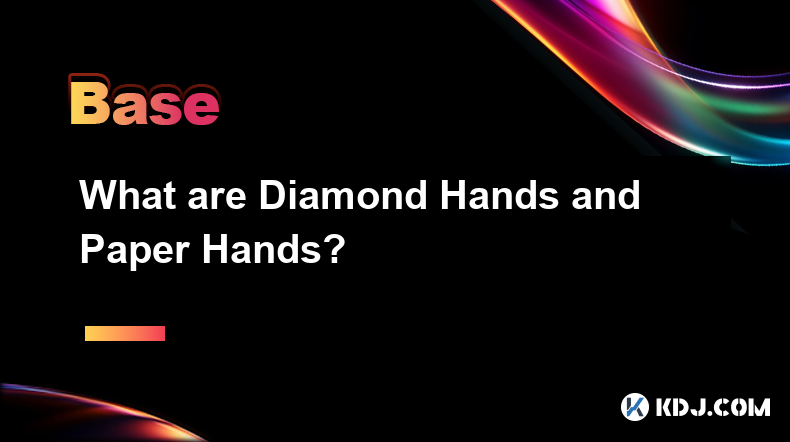
What are Diamond Hands and Paper Hands?
Apr 16,2025 at 10:42am
In the world of cryptocurrencies, the terms Diamond Hands and Paper Hands are frequently used to describe the behavior and mindset of investors, particularly in volatile markets. These terms originated from online communities and have become a significant part of the crypto lexicon, often used to describe the level of resilience and commitment an invest...
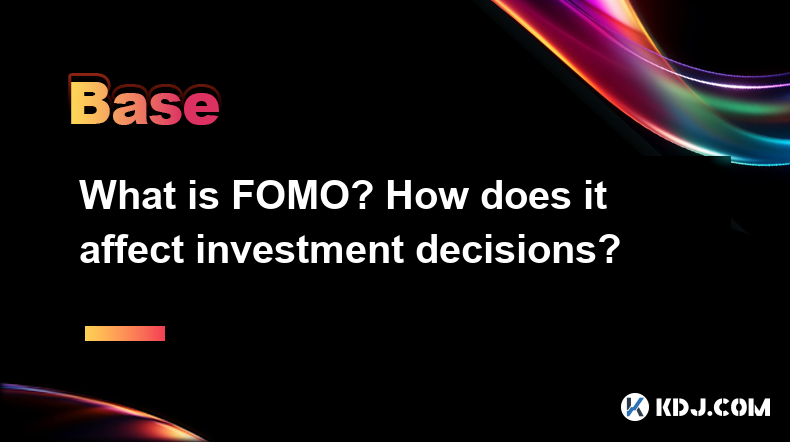
What is FOMO? How does it affect investment decisions?
Apr 15,2025 at 03:22pm
FOMO, or Fear Of Missing Out, is a psychological phenomenon that significantly impacts the cryptocurrency market. In the context of crypto investments, FOMO describes the anxiety that an individual feels when they believe others are reaping rewards from a market surge or a specific cryptocurrency's price increase, while they are not participating. This ...
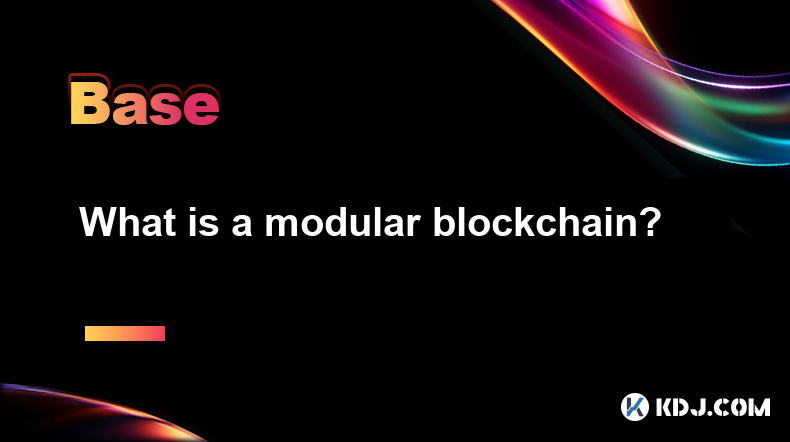
What is a modular blockchain?
Apr 16,2025 at 06:21pm
A modular blockchain is a type of blockchain architecture that separates different components of the blockchain system into distinct, specialized modules. This approach allows for greater flexibility, scalability, and efficiency compared to monolithic blockchain designs, where all functionalities are tightly integrated into a single, comprehensive syste...
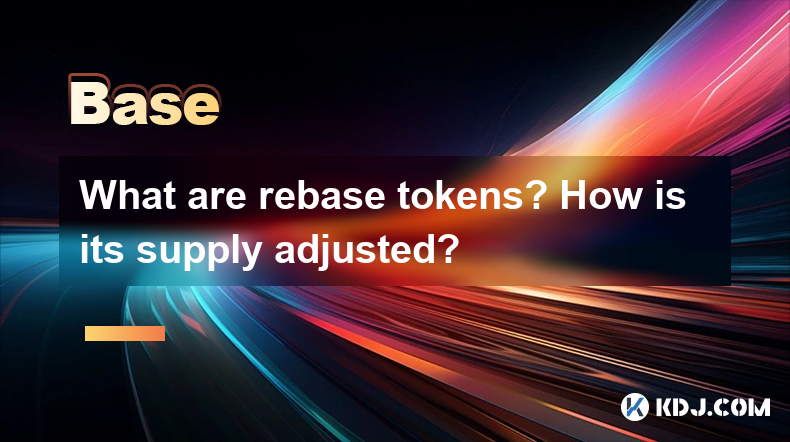
What are rebase tokens? How is its supply adjusted?
Apr 16,2025 at 11:07am
Rebase tokens are a unique category of cryptocurrencies that automatically adjust their supply to maintain a stable price target or to achieve other specific economic goals. Unlike traditional cryptocurrencies, where the supply remains constant or follows a predetermined schedule, rebase tokens dynamically change their total supply. This adjustment proc...

What is Alpha? How to find Alpha opportunities?
Apr 16,2025 at 12:42pm
What is Alpha?Alpha is a term widely used in the financial world, including the cryptocurrency market, to describe the ability of an investment to outperform a benchmark. In the context of cryptocurrencies, alpha refers to the excess return an investor achieves over the market's average return. For example, if the overall crypto market grows by 10% in a...

Why do cryptocurrency enthusiasts like to say GM?
Apr 16,2025 at 06:21am
In the world of cryptocurrency, the term 'GM' has become a popular greeting among enthusiasts. GM stands for 'Good Morning,' and its widespread use within the crypto community has a deeper significance than just a simple greeting. This article delves into the reasons why cryptocurrency enthusiasts like to say GM, exploring its origins, cultural signific...

What are Diamond Hands and Paper Hands?
Apr 16,2025 at 10:42am
In the world of cryptocurrencies, the terms Diamond Hands and Paper Hands are frequently used to describe the behavior and mindset of investors, particularly in volatile markets. These terms originated from online communities and have become a significant part of the crypto lexicon, often used to describe the level of resilience and commitment an invest...

What is FOMO? How does it affect investment decisions?
Apr 15,2025 at 03:22pm
FOMO, or Fear Of Missing Out, is a psychological phenomenon that significantly impacts the cryptocurrency market. In the context of crypto investments, FOMO describes the anxiety that an individual feels when they believe others are reaping rewards from a market surge or a specific cryptocurrency's price increase, while they are not participating. This ...

What is a modular blockchain?
Apr 16,2025 at 06:21pm
A modular blockchain is a type of blockchain architecture that separates different components of the blockchain system into distinct, specialized modules. This approach allows for greater flexibility, scalability, and efficiency compared to monolithic blockchain designs, where all functionalities are tightly integrated into a single, comprehensive syste...

What are rebase tokens? How is its supply adjusted?
Apr 16,2025 at 11:07am
Rebase tokens are a unique category of cryptocurrencies that automatically adjust their supply to maintain a stable price target or to achieve other specific economic goals. Unlike traditional cryptocurrencies, where the supply remains constant or follows a predetermined schedule, rebase tokens dynamically change their total supply. This adjustment proc...
See all articles























































































